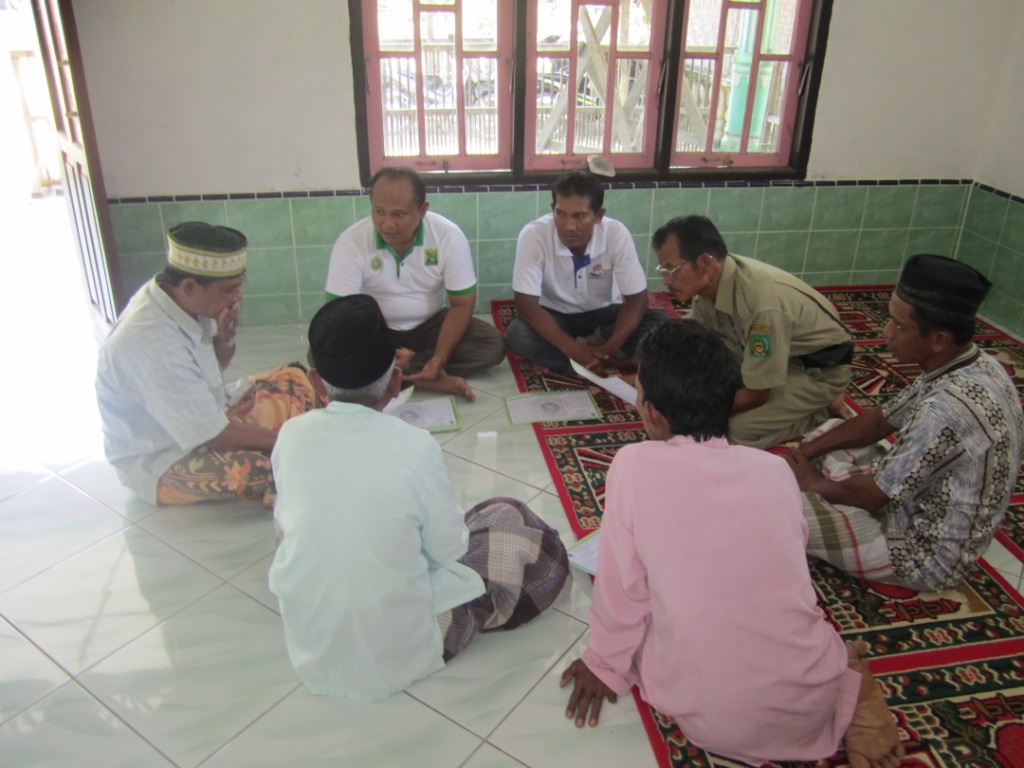Education is crucial to overcoming the conservation challenges facing orangutans, especially in the long term. It's also a key part of our mission. The programs and projects that we fund consist of formal and informal education and training to address the core reasons for the orangutan’s current conservation dilemma: lack of understanding, fear, poverty, and apathy.
When people don't understand the laws or the impact of the illegal pet trade, they might be tempted to purchase an orangutan as a pet. When a hungry orangutan wanders into a farmer’s orchard looking for food, the farmer might shoot the animal with a pellet gun fearing for his life. OURF relies on local Indonesian partners to provide informal education and training to local people in locations near the border of Gunung Leuser National Park where human-wildlife conflict is most prevalent.

Education programs are integral to a comprehensive conservation strategy, according to Indonesia’s Orangutan Conservation Strategy and Action Plan, even helping mitigate forest fires and poaching/illegal trafficking (MoF, 2009):
Education and awareness programs hold a critically important position in changing the public’s attitude towards conservation efforts, especially in relation to Orangutans. An improvement in the public’s awareness would allow them to understand the economic and environmental benefits of forest preservation. In the end, this awareness will motivate the public to act against the causes of damage to orangutan habitats (such as illegal logging) and support orangutan conservation in general.
The public should ideally understand the benefits they can sustainably derive from the forest and wildlife around them, which understanding would mobilize them against illegal logging and other causes of habitat loss. For this reason, the public (especially local communities) should be provided with access to relevant information that would allow them to improve their welfare and livelihood while reducing their dependence on the exploitation of forest resources.
Without any attempts at reducing the fragmentation of forested areas, building corridors to link together disparate patches of Orangutan habitats, reducing habitat loss, and stopping poaching activities, the extinction of the Orangutan species would be an inevitable prospect for the future. There are several concrete policies that would be particularly beneficial to the success of these programs, especially:
Realizing the positive outcomes that organizations and national plans outline requires long-term commitment to education. Delivering one or two education programs to a village might not significantly improve the quality and quantity of the villagers' awareness about orangutans or environmental education. It might take a multi-year effort to inculcate the various key messages that the villagers need to better understand the specific environmental or conservation challenges facing them. Assessing the level of understanding, defining the types of education that would be optimal for the audience, determining the method of delivering the key curricula messages, and measuring changes in knowledge and attitudes following program delivery are important prerequisites for improving education program outcomes. Ultimately, the key messages must be transferred to local teachers and trainers who can continue the awareness and education programs for new arrivals to the community.
Nonprofits have an important role that goes beyond providing the quality of education that students receive in secondary school. Unfortunately, young people are “not currently being exposed to effective environmental education” (Parker and Prabawa-Sear, 2019). Conservation educators from NGOs can augment the students' knowledge of current conservation issues that aren't in their textbooks and encourage them to help create solutions, rather than merely regurgitate facts provided by their teachers.
OURF’s Orangutan Caring Scholarship Program provides college scholarships to worthy Indonesian students studying biology, forestry, and veterinary science. The program is a formal partnership with the local implementing NGOs that manage it in the various orangutan-range provinces. Recipients are not only required to perform well in their academic program, but also to help local NGOs with outreach, education, and conservation activities throughout their matriculation. These students gain a deeper understanding of various conservation and environmental issues and become more proficient advocates for orangutans and the local environment.
Ministry of Forestry, Republic of Indonesia. (2009). Orangutan Conservation Strategy and Action Plan from 2007 – 2017, Government of Indonesia.
Parker, L. & Prabawa-Sear, K. (2019). Environmental Education in Indonesia: Creating Responsible Citizens in the Global South? Routledge, London.